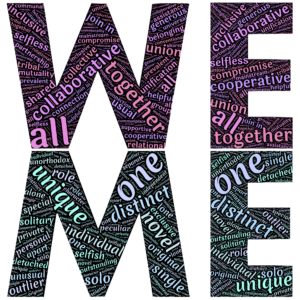How Do We Become a Kinder Community?
Community isn’t something that just happens to us.
It’s something we build.
Naheed Nenshi
This is a continuation of my last message, Who do We Want to Be as a Community? Reading it will give you a background for this post.
Once we choose a lens of kindness through which to view homeless people, we are inclined to think about solutions that consider their needs as well as the needs of the rest of the community. Let’s look at some ideas that have arisen from our community’s conversation on this issue.
On the Nextdoor platform, we heard from a woman who had spent months talking with unhoused people on the streets in Asheville, North Carolina. I commend her for her commitment to understanding the issue. Many of the ways that she proposed addressing the issue, however, focused on how to eliminate the presence of people on the streets rather than addressing their needs.
Since my response to her proposals addressed several of the issues that many communities face, I want to share some of our interchange with you.
Janet shared the following suggestions (in italics)
Enforce existing code and statutes for littering and vagrancy, public drunkenness, camping, disorderly conduct, and for any other applicable law. Homelessness is not illegal but these things are.
These statutes Do make existing as a homeless person in our town illegal. How does a person without a home live without loitering or vagrancy?
vagrant: “a person who wanders about idly and has no permanent home or employment; an idle person without visible means of support.”
Why don’t we find ways to coexist in a way that meets their needs as well as ours. I agree that disorderly conduct must be responded to. Having known several people who live on the streets, I have seen the frustration of challenges that we cannot even imagine build up to a point of “disorderly conduct.”
How can we respond in a way that does not treat them as criminals? Can we find a way to offer the help that they need? I don’t have the answer, but I believe that, together we can find one.
Camping is another issue that requires a compassionate response. People without homes, understandably, will try to create one in whatever way they can to protect them from the elements.
I agree that any camping site should be kept clean and free of human waste. Why can’t we provide a place where they are allowed to camp if they keep the area clean. The city could provide porta-potties and trash receptacles, and organizations in town that provide services to the homeless could bring needed supplies and services to them.
Get the DA on board. Stiffer penalties for repeat offenders. Yes, there may be a short-term increase in incarceration rates, but the overall goal of not tolerating vagrancy or drug use will have downstream benefits.
Wow! Not tolerating vacancy or drug use is criminalizing people for the life-threatening challenges that they live with. Let’s find a more humane response.
Make Asheville less desirable and inconvenient to transients. No public distribution of supplies, clothing, food, etc, except at designated sites managed by licensed agencies. Distribution centers should be co-located with support services in physical buildings, no mobile support or distribution.
Making Asheville inconvenient to people from out of town would have a big impact on everyone currently unhoused in Asheville. Several churches provide food, clothing and supplies that help to meet the critical needs of people living on the street.
Mobile support and distribution is a necessary piece in the delivery of supplies and services. Many homeless people will not go to licensed agencies, because they have had bad experiences there.
BeLoved provides essential services to folks on the streets with their truck that carries essential supplies, including warm clothing for people who are living exposed to the weather with little protection. They go out to find people who do not go to official support services for various reasons including the fact that many people are victimized by other homeless folks who assault and/or steal from them everything that they have.
It makes no sense to disallow these necessary, compassionate services to people who benefit from them.
Create an earned benefits system for the homeless. Credits for participating in public trash collection, downtown maintenance, volunteer time etc. that can be converted into vouchers (not cash) for transportation/uber, bus tickets, pet food, haircuts, or other desired goods or services not available through conventional agencies. Create accountability and a constructive way to earn money other than panhandling.
Excellent idea. I would like to see it expanded and implemented.
Re-evaluate enabling support programs ie: needle exchange… Should we really continue to support this individual choice when it results in harm to communities? … Enabling users is contributing to the problem.
I encourage you to see this problem through a different lens. Drug abuse is the result of an addiction, which is hard to recover from. Many people became addicted after a foolish mistake in judgment, but now they cannot easily get out of it. Even law-and-order guy Rush Limbaugh was a victim of the prescription pain killer that led to his addiction.
I believe that we need to support programs like needle exchange and distribution of Narcan (naloxone) which will prevent death from an overdose and save lives. In Asheville today, we have the added danger from Fentanyl which, when added to the original drug, unknown to the user, makes it much more dangerous. Narcan can save lives but only if used quickly. No matter what you think of drug addicts, I hope that you do not want to see them dead.
Treatment is the ultimate answer, but first people need to want it – many have tried unsuccessfully or just aren’t ready to take that step. Let’s at least give them the opportunity to live long enough to reach that point.
Focus resources more tightly around those most likely to be responsive and successful.
I agree that it makes sense to begin by focusing initially on people who are more responsive to services that help them. Let’s not write off those who are harder to help. We need a compassionate approach to people with mental illness more appropriate than just leaving them on the street. At the very least, let’s see them as our neighbors in trouble, rather than unwanted people to be removed.
This truly is an issue that will define us. Let’s address it by bringing the best of our ideas and our hearts to work together to make Asheville a city that we can be proud of.
That exchange led Larry and me to return to our ideas about solutions. We support the Housing First concept. First, get people into safe housing, then surround them with services that will provide the help that they need to address the other challenges that they face.
We are, also, very interested in the Community First concept. Since many housing options are in high rise buildings with no shared space, people end up disconnected from each other.
We believe that safe communities can be planned and developed to provide housing and services that enable people to address their challenges, to use their talents, and to contribute to others, while receiving what they need. We know of some successful examples, and in the future, we will share more information about how they have responded to the crisis of homelessness.
Thank you for reading this to the end.
We hope that you are safe and appreciating the blessings in your life.
Image by John Hain from Pixabay
What are your thoughts? Do these ideas speak to you? Please leave a comment below. Thank you.
Help us to spread messages of kindness. If you know others who might appreciate these ideas, please share below.

